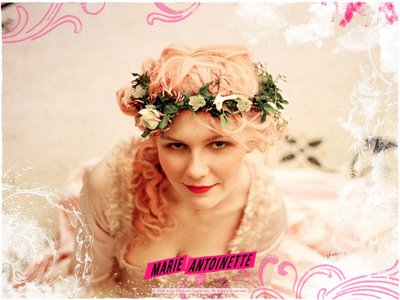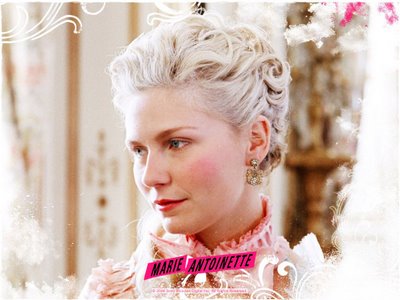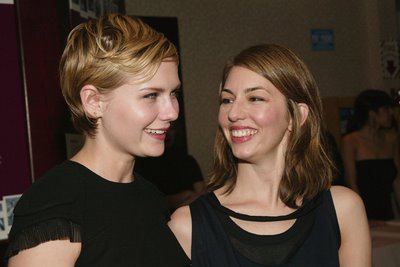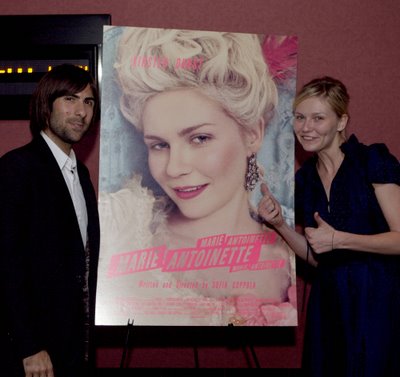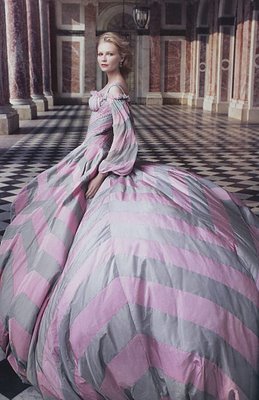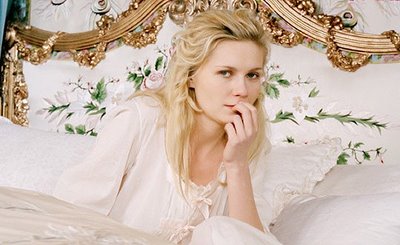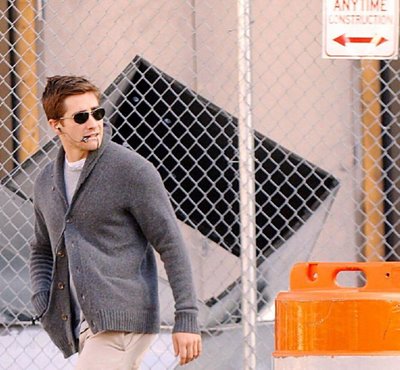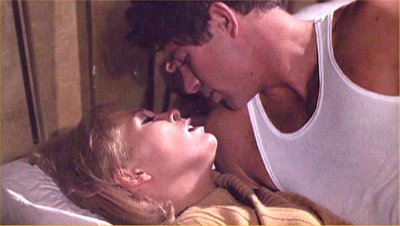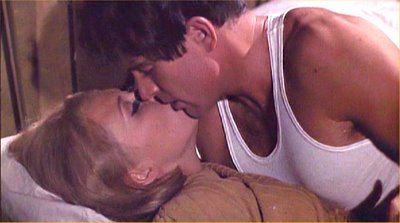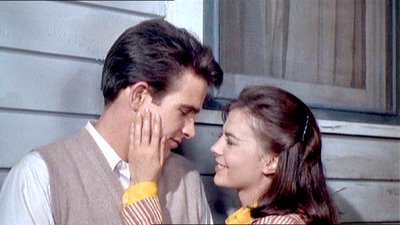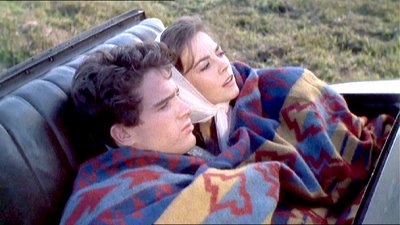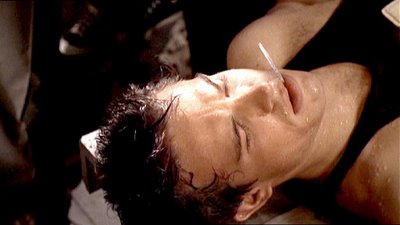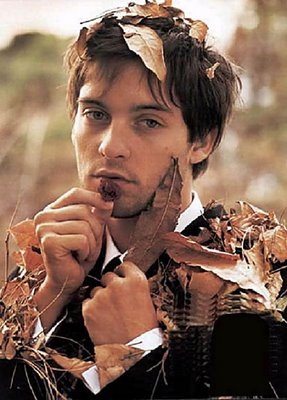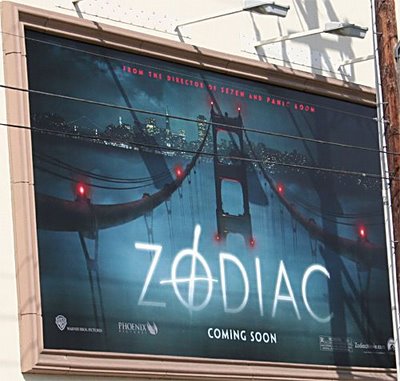
Sean O'Hagan (Sunday October 08 2006) The Observer
"It's kind of uncomfortable having to do this stuff right now,' she says, referring to the fact that she is promoting her new film, Marie Antoinette, while heavily pregnant. 'It's hard to, um, sit right.'
If her vagueness and her sulkily beautiful Mediterranean face combine to make the 35-year-old Coppola seem like a slightly out-to-lunch teenager, I suspect this may be a way of keeping the world at bay. And keeping control. No other young female film director possesses her kind of clout in Hollywood, and this is not just to do with her dynastic name. Marie Antoinette is a lavish but flawed historical drama, a huge leap in scale for her, and an even bigger leap of faith by Sony studios who gave her $40 million and total artistic control.

Marie Antoinette is all atmosphere. Based loosely on Lady Antonia Fraser's revisionist biography of the Austrian-born queen, it was shot on location in Versailles with a stellar cast that includes Kirsten Dunst, Jason Schwartzman and Steve Coogan, as well as several hundred extravagantly dressed extras. It is a gorgeous-looking soufflé of a film whose perceived lack of a political subtext or even point of view has already caused an unholy row in France. 'It's kind of like a history of feelings,' Dunst said recently, 'rather than a history of facts.'

Perhaps for this very reason, it was booed by some sections of the audience at the Cannes' Film Festival earlier this year, and more recently dubbed 'a scandal' by Liberation's film critic, Agnes Poirier. 'History is merely decor and Versailles a boutique hotel for the jet set, past and present,' fumed Poirier, 'All we learn about Marie Antoinette is her love for Laduree macaroons and Manolo Blahnik shoes.' Sofia can't see what all the fuss was about.
'It's very French', she says, shrugging, when I bring up the catcalls at Cannes, 'Afterwards, I had a lot of French journalists saying, "I like your Marie Antoinette but I still hate the real Marie Antoinette". I guess she's still kind of a loaded subject there. All I can say is that I set out to challenge myself with each movie, and having to do a period film was a huge challenge. How to do it in a fresh way, and from the point of view of a strange girl in a strange world. If you attempt something new, it's always a risk.'
Was she surprised, though, by the vehemence of the reaction? 'Well, there was a standing ovation, too,' she says calmly, as if the continuing controversy is just water off a duck's back. 'I think the booing was not really that loud. It was picked upon and reported because, you know, it's a better story than a standing ovation.'
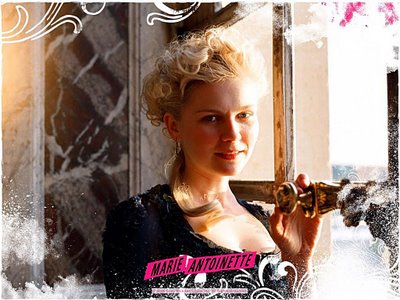
Lady Antonia Fraser, who has become friends with Coppola since the director purchased the rights to her myth-puncturing biography, can't see what all the fuss is about either. 'I love it,' she trills, 'It doesn't deviate from the story, but nor does it copy the book slavishly. It's Sofia's vision of Marie Antoinette. My vision was within the covers,hers is in the images on the screen. I enjoyed it enormously and so did Harold [Pinter].'
This is indeed the case. 'He liked the film. He wrote me a sweet letter,' says Coppola, smiling. ' That meant a lot. I mean, he's so honest. I don't think he'd write a letter if he didn't mean it. It's like, if it turns out that nobody else likes it, I can still say, "Well, at least Harold Pinter did".'
Given the times we live in, Marie Antoinette could well become a box-office hit, too. While not quite as shallow as Poirier paints it, nor as visionary as Lady Antonia insists, it is an oddly empty film. Having moved away from the cool contemporaneity of her previous mood piece, the lauded Lost in Translation, Coppola seems adrift in the ancien regime. The result is a historical drama for the Wallpaper* generation, all sumptuous interiors, dresses to die for, and an oh-so-ironic Eighties glam-pop soundtrack. As Bow Wow Wow's trash classic 'I Want Candy' blares out its blatant message of self-gratification over yet another baroque
party scene, you wonder what happened to Coppola's signature style, the hazy, impressionistic, understated languor of her two previous outings.
Her debut, The Virgin Suicides, was also an adaptation, in which Jeffrey Eugenides' contemporary gothic novel was given a terminally narcotic hue, even if the virgins of the title looked like they had been created by Coppola's fashion buddy Marc Jacobs.
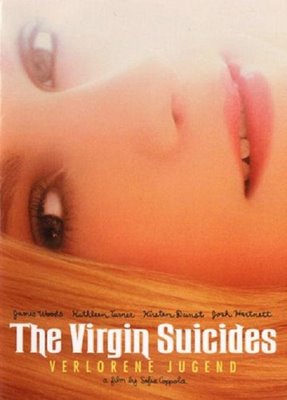
It was followed by Lost in Translation, another meditation on dislocation, that became an unlikely mainstream hit, grossing $44m. It, too, was melancholy in tone and perfectly caught the singular loneliness and creeping enervation of hotel
rooms in strange cities. It made Scarlett Johansson a star and kick-started Bill Murray's ongoing late career as Hollywood's favourite ageing hipster, a title he inherited from the equally deadpan Harry Dean Stanton. Along the way, Coppola became an arbiter of a new kind of cinematic cool in which, as Vanity Fair recently put it, 'youthful naivety and impeccable taste reign supreme'.

There is a sense that all Coppola's films to date have in some way been autobiographical. Or, as as she puts it, 'they tend to be someone who's lost in the world, the girl who has to find her way'.
The young Sofia Coppola was that very girl, and the world she inhabited in her formative years, though gilded, could have suffocated a lesser talent. She was born Sofia Carmine Coppola on 14 May 1971, into a Hollywood dynasty where her father, Francis Ford Coppola, reigned supreme. Her mother is Eleanor Coppola, a documentary film-maker; her aunt, the veteran Hollywood actress Talia Shire; and her cousins the actors Nicolas Cage and Jason Schwartzman. The likes of Steven Spielberg, George Lucas and Marlon Brando were regular dinner party guests.
The family moved west in the Seventies from New York to California's Napa Valley, where her father now owns a famous vineyard. It produces a champagne called Sofia, which is described on the label as 'revolutionary, petulant, reactionary, ebullient, fragrant, cold, cool'. The real Sofia once described it simply as 'embarrassing'. Before he moved sideways into wine production, her father lived and breathed movies. 'Everyone in my family is in the film business,' she once said, 'and that's all we talked about... I had a 20-year tutorial on film in my own home.'
Her earliest childhood memories are of sitting on Andy Warhol's knee and helicopter rides over the Philippines jungle, where she lived for nearly two years while her father almost killed himself and bankrupted a major studio while making Apocalypse Now in the early 1970s. 'It was fun,' she smiles. 'I didn't really think of my father as a famous film director. He was just, you know, my dad.'
While her father famously sweated, shouted and swore his way through his epic films, his daughter is a Zen-calm presence on set, the still centre of the organised chaos that is a film shoot. 'I'm not a yeller,' she says, smiling. Her cousin, Schwartzman, whom she cast as Louis XVI in Marie Antoinette, said recently of the experience, 'I never saw her freak out once. She's totally calm, she's like this lighthouse.'
Given her father's long shadow, it took Coppola some time to find her creative footing in film. In her twenties, having graduated from the California Institute of Arts, she dabbled in fashion and photography, for Karl Lagerfeld and French Vogue respectively, blessed by her family's name and social connections, but unable to excel in either world. She studied painting, too, then briefly and disastrously tried acting, unwisely appearing as Al Pacino's daughter in The Godfather Part III, a bad performance in one of her father's most disappointing movies. The critical mauling she received meant that even the casually cruel world of fashion seemed preferable, and she returned to that milieu, creating her own label called Milk Fed which still exists as a lucrative Japanese franchise.
'I was kind of lost and unfocused,' she says now of that uncertain time. Then, in 1998, with her father's encouragement, she made Lick the Star, a short film set in a girls' high school. 'I just loved the way it looked,' she says, smiling, 'and it kind of helped me find my way. With the acting thing, everything was so public. I don't really think of it was a big mistake, it was more a way of finding out what I didn't want to do. I'm much more comfortable behind the camera.'
This is where she has remained ever since, and with considerable success. At 35, she has an Academy Award and three Golden Globes under her belt, all for Lost in Translation. The same film made her only the third woman, and the first American woman, ever to be nominated for an Oscar as Best Director.
Interestingly, that film was made during a period of personal turmoil, and the events that unfolded onscreen seem to have echoed the fracturing of her marriage to the hipper-than-thou director Spike Jonze (Being John Malkovich, Adaptation). When I ask her about Jonze, she shifts in her seat and says, 'We're, um, not that in contact any more.'
For a time, Coppola was linked to Quentin Tarantino, who namechecked her in the credits to Kill Bill Vol. 2 in 2004. Right now, though, she is settled and expecting her first child next month with Thomas Mars, singer with the French electronic rock band Phoenix. Her hip credentials are impeccable. She has become something of a muse for her friend, the fashion designer Marc Jacobs, who once named a bag after her and employed her as the face of his eponymous perfume. She hangs out with Sonic Youth and makes videos for the White Stripes.
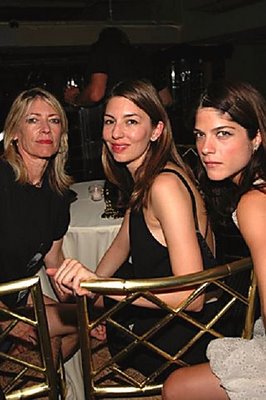
Sophia Coppola with Kim Gordon (Sonic Youth) & Selma Blair
Her style and quiet, almost childlike air have made Coppola an icon of contemporary cool for a generation who seem to have some difficulty growing up. Among her Zeitgeist-defining cinematic contemporaries are her friends Wes Anderson (Rushmore, The Royal Tenenbaums, The Life Aquatic) and Zoe Cassavetes, daughter of director John, who is currently shooting her first feature film. According to Vanity Fair, 'they're not a Brat Pack; they're a Play Group' whose collective grooviness is supposedly predicated on 'sojourns in Paris, the best new bands, 1970s songs that no one has ever heard, the perfect shoe'. Film-making, then, as fashion, with Sofia as the queen of the catwalk.
Unsurprisingly, this kind of cultural reductiveness irks Coppola.
'Yeah, yeah,' she sighs wearily, when I mention the play group analogy. 'People have to find these scenes to fit you into, really. It makes it easier to write about you, I guess.' So the sense that there is a shared aesthetic - a kind of collective ironic cool - is wrong? 'Oh, I wouldn't say it's wrong,' she drawls, unfazed, 'I mean, you can look at things any way you want, slant them to suit your point of view. I guess it is an aesthetic more than a movement, but, you know, I do have my own aesthetic too, the people I look to and admire.' Could she elaborate? 'Well,
um, when I was growing up, it was Godard, Truffaut, the French New Wave. The style was so cool to me.' So, your own aesthetic is essentially about style rather than, say, story or drama? 'Um, I guess. I mean, I've always been drawn to individuals really, people with their own distinctive but identifiable style that no one else has. That's all I try to do, find my own distinctive way of doing things.'· Marie Antoinette opens on 20 October
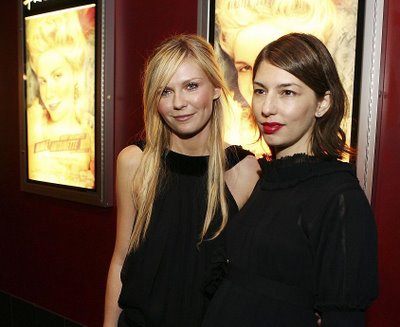
Copyright Guardian Newspapers Limited extracted from
The Observer article courtesy of Penny Lane.
